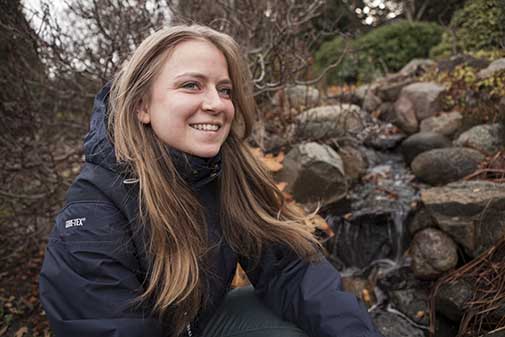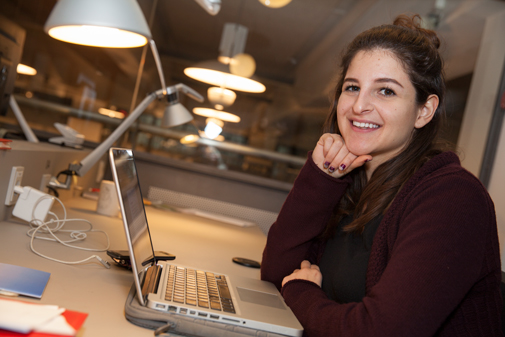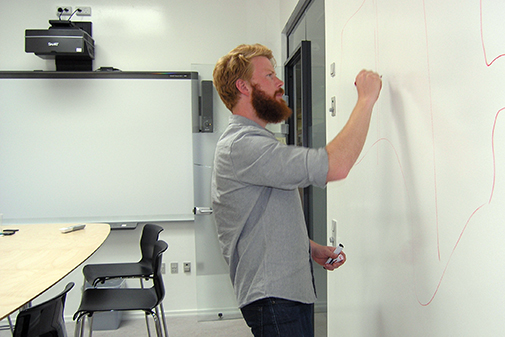Testimonials
Read testimonials from students and graduates from the Master of Science programme (MSc) in Geography and Geoinformatics:
When we met with Astrid Bisgaard, she had been working for NIRAS, the engineering consultancy firm, for a year.“I’m 100% happy that I chose to become a geographer. It’s unique that you can customise your degree programme to such an extent, and that it is so practically applicable. It’s easy for people to see what they can use a geographer for.”

How did your master’s programme progress?
The programme is very broad during the first eighteen months – you don’t specialise at all. But there’s a lot of freedom of choice in the last eighteen months of the bachelor’s programme. The subjects you choose determine whether you end up specialising in physical geography or human geography.
I actually thought I wanted to do something related to developing countries and urban planning. But I was so inspired by my lecturers that I chose physical geography. Perhaps because you can see and feel what you are working on in the physical geography subjects.
I did a six-month exchange in Australia, where I attended the University of Western Australia in Perth. I did four courses in Environmental Studies. We looked at cases of how people change their attitudes to environmental issues over time.
And then we did a lot of field studies – it was really great. Huge rivers and cliffs, all on a much larger scale than in Denmark. The teaching also included a lot of unusual topics, like how to protect the coral reefs or the habitats of the kangaroos.
What did you specialise in on the programme?
I find the link between water and climate exciting, so on the master’s programme I picked everything related to water – subjects like Fluvial Morphology, which deals with rivers and groundwater modelling, and climate-related courses. I supplemented with geology subjects, as I wanted to include the groundwater element and understand the whole hydrological angle. So you could say that I specialised in hydrogeography.
My master’s thesis was quite extensive, giving 45 ECTS credits. It took over nine months, three of which were spent on fieldwork. Doing a lot of fieldwork means that you can use your own data in the thesis.
I was in Tanzania to look at how climate change will affect the large Ruaha river. There is a national park at its source. Further downstream, it runs dry if there is not enough rain, causing hardship for animals and people alike. I tried to set up a model and run scenarios for future changes to the river.
How long after graduating did you get a job?
I actually got a job before I had even finished my studies. I had a student job with NIRAS, the engineering consultancy firm, while I was studying, where I did a lot of fieldwork – searching for wells and the like. I didn’t really have time to work for them while I was doing my master’s thesis, but they remembered me, and offered me a job in the NIRAS department in Allerød one month before I finished.
What does your job involve?
I work with water and supply. I’m in a team that works with groundwater and the natural environment. My duties relate to nature restoration, groundwater modelling and climate adaptation.
The great thing is the interdisciplinarity and being able to explore every corner of the field. A typical task might be to help a municipality work out where the protection zone around a drinking water bore should be, so that the groundwater can be properly protected against pesticides or other chemicals etc.
Another task could involve nature restoration. In Sillebro Ådal near Frederikssund, there are problems with the diverted river overflowing when there is a cloudburst, so rainwater and sewage get mixed together.
Instead of culverting the river, they have decided to turn the valley into a nature project with recreational areas, where basins have been created with reeds and ducks that can hold excess rainwater.
Such a project involves analysing the topography of the area and working out how the rainwater will flow, and where basins can be excavated. We use a GIS – Geographical Information System – for this purpose, a map tool that works with vector graphics/geodata. I strongly recommend that students spend time on this, so they get a basic understanding of how such programs work. It really gives you a head start.
In retrospect, do you feel you chose the right programme?
Yes. I’m 100% happy with my choice. There are not many geographers in my social circle. I get the impression that it’s quite unique that you can customise your degree programme to such an extent, and that it is so practically applicable. It’s easy for people to see what they can use a geographer for.
Georgia is studying for her Master's Degree in Geography and Geoinformatics at University of Copenhagen. We met her at the university’s Geocenter, in the heart of Copenhagen.

I came to Denmark in 2011, the third year of my bachelor, for half a year, and I went to Aarhus University. Then I went back to the States to finish my degree.
I wanted to go back to Denmark, because I liked it so much, so I found an internship at the US Embassy in Copenhagen and stayed there for the summer. I fell in love with Copenhagen, and decided that I wanted to apply for a master’s programme and here I am.
Why did you choose Europe?
My father is from Greece and my grandmother is from Germany, so I have a Greek and an American citizenship. If I didn’t have a European passport, I would have to pay a tuition fee.
Why did you pick Copenhagen?
It was the city and the programme. I wanted to stay in geography, and University of Copenhagen was most relevant to my field, because it has a lot to do with development geography in the global south.
What’s your thesis about?
After studying here, I realized I was really interested in migration, so I decided to do my master’s thesis on international education in Denmark and Danish gymnasiums. So I’m looking at a case study school and the International Baccalaureate programme. The migration part of it is how this international education prepares students for future mobility within the EU. I’m mostly doing qualitative research with students and interviews.
Do you find it difficult to study here?
It’s like any degree: It’s challenging, it’s hard work, but that’s what you do, when you go into a master’s programme. What is difficult is getting into the different learning styles. The group work, the independent learning, the oral exams.
You were not used to independent studying?
Not at all. In my bachelor’s programme, I had assignments to do every week. I was graded on coming to class, I was graded on participating in class – it was sort of like high school. And here it was just my final grade which was counting, and if I didn’t pass that, I had three more chances, but still it’s based on one final exam. At least in Geography I have never had a non oral exam. It’s always like this: you submit an assignment and then you orally defend it.
Are the relations to the teachers different here?
Yes. You are a lot more informal with your teachers and they take your personal experiences into account. In the United States, it’s more based on a hierarchy and here it’s very flat.
And in the United States, if I didn’t hand in my exam, that was it! There was no exceptions, no excuses. Even if you were sick, you had to have it done, unless there was medical emergency and you had a note from your doctor. Here they really do take account for your personal situation – it’s more fair.
How does it feel to be an international student here in Copenhagen?
Well, I can say that nearly all of my friends here are international students. I guess they are more outgoing. I have one Danish friend. And some of my other friends are from Norway, so they are international but they are still Scandinavian.
What do you think of the study environment, the facilities … ?
The facilities are really, really cool. Especially the KUA (the part of Copenhagen University situated on the island of Amager) where you have art installations everywhere. It really makes you want to stay there and inspires you to work. I live on Amager, so it’s convenient to use the facilities there.
The Geocenter here is part university, part high school … it’s an interesting building, but it’s a bit strange to mix university and high school. You come in the cafeteria, and there’s the young kids screaming around. But there’s the thesis room up here, which is my stomping grounds – it’s really cosy, there are potted trees and it’s easy to make an area for yourself.
What kind of jobs can you get when you finish your master’s?
It’s a geographer’s dilemma. There are so many ways you can go. I have interned for an NGO here – the Bahrain Human Rights Center – doing visualizations and data processing, and I can see myself working for an NGO.
At the same time, I also have a background in environmental planning and GIS, Geographic Information Systems, which is used for organizing and visualizing data. Any company or organization can use that skill, because it doesn’t matter if it’s health – they can use it to track the outbreak of epidemics – or for instance at the human rights center where we are working on geotagging all the instances of police brutality in Bahrain. So it’s a very useful skill.
Your own dream about a future job: you mentioned an NGO ... how would you like to work?
My dream job would mean a lot of work and maybe would not bring such a lot of money. I would like to work with migrant worker rights. In the US we have a lot of immigration issues, so there’s a lot of work to be done to help people there.
I’ll definitely go looking for a job here for a while. Maybe I will stay a few more years. But I would like to be closer to my family in the future.
Do you have any good advice for foreign students coming to Denmark?
Train your presentation skills for the oral exams. I failed the first few classes I had, because … my papers were great, but my defense was not. And I was used to this hierarchy, so I was expecting the teachers to be asking me questions, so I didn’t take the lead.
And make sure to participate in activities – because the weather can really affect you. In the winter it’s so dark and gray, so you don’t want to leave the house. You need to be proactive. I joined the university sports club – it’s really cheap. They’ve got so many great classes, and that’s where I had my first Christmas lunch, so that’s a great place to make Danish friends also.
Interview with Jeppe Bo Svendsen, newly graduated geographer.

What made you decide to study Geography?
I did my bachelor’s degree in Engineering at the Technical University of Denmark, in urban, energy and environmental planning, focusing mostly on urban planning.
I chose the master’s programme in Geography at the University of Copenhagen because it offered more of a social science perspective on urban planning. On the Geography programme, the emphasis is on the theoretical understanding of the processes influenced by urban planning, while engineering is far more technical.
How did your master’s programme progress?
I did courses in economic geography and learned about the correlation between the development of cities and economies. The classes on the correlation between the geographical location of companies and their economic development were an eye-opener for me. It made me want to influence growth through urban planning.
What are you working with now?
I’m currently working as an urban planner in the Municipality of Hørsholm. It’s an interesting and varied job, where you have to take account of national legislation and concerns as well as very local issues.
As an urban planner, I contribute to creating some of the structures that shape growth and opportunities for citizens and companies. My job also involves the administration of the same plans and laws. So I create the frameworks, and find out how they work in real life.
Can you describe a typical working day?
A typical working day involves a wide variety of tasks. I’m involved in case handling, like drawing up local plans based on applications from citizens and companies. As a civil servant, I also draw on my specialised knowledge to help politicians make decisions about matters affecting my area of specialisation.
How do you use geography in your work today?
I draw on my knowledge of geography when assessing the challenges the municipality is likely to have to address in the future, and how to analyse them. I also draw on my academic background when asked to outline various development opportunities for the municipality.
Were there specific courses that led you in the direction you now work with?
There is no doubt that I’ve been guided by some of the courses I did as part of my studies. Two courses – ‘The Dynamics of City Regions’ and ‘Production and Regulation of Landscapes’ – spurred my interest in the interaction between economics and urban planning.
Do you have any tips for future students who are unsure what degree programme they should choose?
Spend some time investigating the available options. If you want to work in a particular field, there are usually different paths you can take. Perhaps even some you haven’t heard of.
Don’t just think about what’s exciting, but also about what you are good at and how you like to work.
And don’t worry if you have trouble finding your dream degree programme. It probably doesn’t exist. However, you can often to some extent shape your programme along the way as you work out what you find most interesting.
Interview with Katrine Maria Lund Johansen, a Geography graduate.
What made you decide to study Geography?
It was primarily my interest in people and nature, and sustainable ways for people and nature to interact. The opportunity to get out and do fieldwork also appealed to me a lot.
What are you working with now?
I work with contaminated soil and groundwater for Ramboll, the Danish consultancy firm. This means studying soil, water and pore air samples to delimit contaminated areas.
Sometimes municipalities require that soil excavation be done under environmental supervision, and in such cases I could be the person responsible for that supervision.
I also look at the history of a given site and map potential sources of contamination, and I look at previous activities on the site. Perhaps there has been a machine pool at the site, where degreasers, oil products, refrigerants and lubricants have been used, and it might relevant to map degreasing plant, floor drains, sewers and tanks for oil and lubricants.
Can you describe a typical working day?
I don’t really have a typical working day, as I work with large projects lasting several weeks as well as smaller projects that take only two hours. The variety really appeals to me.
I attend internal department meetings and meetings with customers to scope projects. I might also be involved in doing survey proposals, examining the history and identifying potential sources of contamination, and then defining an analysis programme to delimit it.
On another project I might have to use PID (Photo Ionisation Detection) to measure the concentration of organic components in soil samples brought in by a contractor. I will then select which samples to send for analysis in order to identify the specific contamination.
How do you use geography in your work today?
A major part of the degree programme is about learning to acquire knowledge and analyse complex problems.
Since geography involves many processes and the interplay between these, I’m used to analysing problems where I have to take many factors into account, and where there is not necessarily a single ‘right answer’. I use this competence every day in my projects.
Has the degree programme equipped you well for working life? Or was it your student jobs that led you to where you are today?
Academically, the degree programme taught me about the topics that I work with each day. My student job with the City of Frederiksberg taught me how to juggle a lot of projects at the same time and to prioritise tasks, so as to best serve colleagues and citizens. I draw on this experience every day.
Have you chosen a specific academic direction within geography?
When I started my studies, I was interested in human geography, but in my third year I became more interested in physical geography, and chose that direction on my master’s programme.
It was probably a subject on terrestrial environmental chemistry in my third year that aroused my interest in physical geography. It led me to focus on subjects to do with soil conditions and climate. I first became interested in contaminated soil after graduation, and I therefore did a supplementary course at DTU.
Do you have any tips for future students who are unsure what degree programme they should choose?
You should definitely choose your degree based on your interests. It’s impossible to predict the employment situation for graduates in five years’ time.
I also think you should allow yourself to switch to another programme or change direction during your studies, and to do supplementary courses afterwards if it helps you take the direction you want.
